Socialism is back. Well known for their love of avocados and Netflix, Millenials are now also apparently embracing the radical leftist politics of economic equality and public ownership of the means of production.
That it is young people who are seen as supporting socialism is not surprising. This support is embodied (in the United States) in the surprising insurgent candidacy of self-described socialist Senator Bernie Sanders for the Democratic presidential nomination in the 2016 primaries, and the election of democratic socialist Alexandria Ocasio-Cortez to the House of Representatives in the New York 14th District in 2018. Ocasio-Cortez has also famously advocated for a "Green New Deal", which would significantly alter the American economy (and grow the size of government).
In Australia, it partially stems from young people's greater support for parties of the left — including Labor and the Greens — and generally low rates of voting for parties of the right.
A common thread in many of these critiques is that this Millenial support for socialism is the result of a mix of anxiety and ignorance; driven by their coming of age after the fall of the Soviet Union and Mao’s rule in China but during the Global Financial Crisis, with many finding it hard to secure the middle class lives they expected. However, these studies have often made assumptions about the ways respondents understand the term ‘socialism’. Are there generational or other differences in how it is interpreted and does this influence the way people answer questions about the topic?
To understand what Americans and Australians think of socialism, the United States Studies Centre and YouGov surveyed 1,000 respondents in the United States and 1,056 in Australia in late March 2019.
We found that when we dig down into the attitudes of voters, despite fewer older Americans and Australians saying socialism would be good for their society, they describe it in broadly as positive terms as younger voters, and support many of its core tenants at roughly similar rates.
Older Australians use more positive words to describe socialism than younger people. In the United States it is those in the middle age group. Younger respondents were less able to coherently explain what they thought socialism was, but this rate was generally low for those younger respondents who supported more socialism (especially in Australia).
Although younger Australians and Americans are more likely than older respondents to say that more socialism would be good for their country, in Australia it was older respondents who were more likely to prefer the government actually running most of the economy. In both the United States and Australia, older respondents were also more likely to support the government providing guarenteed jobs and living standards.
Much of the difference observed between Australia and the United States in terms of support for government involvement in the economy was driven by Republicans. When it comes to the government owning and operating most major parts of the economy — roads, healthcare, public transport, education, utilities — Coalition voters look much like Labor voters, and older Australians are more socialist than younger voters. However, in the United States, older voters are much more suspicious of government ownership, and most Republicans do not even believe in government ownership and operation of schools or roads.
What voters think about socialism, in their own words
We gave Australians and Americans the opportunity to tell us exactly what they thought, by asking the question "What is your understanding of the term 'socialism'?" and allowing them to provide any answer they liked, in their own words.
In the figures below we plotted the words Australians and Americans used to describe socialism.
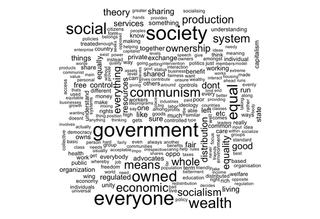
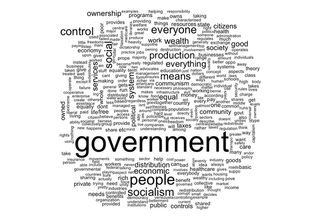
Australians were more likely to talk about ‘community’, ‘society’, ‘ownership’ and ‘wealth’. Although ‘government’ was mentioned frequently by Australians in connection with socialism, for Americans it was the most common descriptive word they used. Everything else was secondary.
What precisely did these respondents say about socialism that was so positive, and negative?
One Australian respondent described it as ‘for the good of all’. Others that: ‘Socialism is where the government controls the wealth of people’ and that it involves ‘good for me’. A few were perhaps a little more mercenary, saying it was ‘Equality! Sharing the wealth and sharing the poverty’.
Other respondents were less positive. One said: ‘They are criminals’. Another said of socialism that: ‘Its a bad thing people got’. One just said ‘bad’.
Scoring these words
We used the words respondents themselves used to describe socialism to score their feelings about the concept. We measured this by running the words respondents used though a sentiment analysis using the AFINN lexicon. This is a list of English words, rated for valence with an value of between minus five (negative) and plus five (positive). The words were manually labelled by Finn Årup Nielsen between 2009 and 2011.1
We validated this by comparing the scores we derived from this process with their answer to the question:
Australia / The United States would be improved if we had
- Much more socialism
- A little more socialism
- No more and no less socialism
- A little less socialism
- Much less socialism
As can be seen in the figure below, when answering this question, most respondents said they did not think Australia would be improved if it had more socialism. However, a larger proportion thought the country would be better if it had more socialism rather than less. In the United States, most respondents believed less socialism was preferable.
Proportion of respondents saying society would be improved by more or less socialism
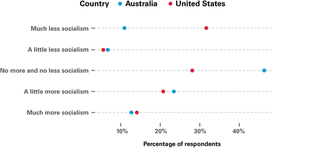
When we compare our the results of our sentiment analysis to these results, we find that respondents who thought that their would be improved if it had more socialism were also more likely to use positive words to describe socialism. This validates both methods as potentialy useful for measuring socialism.
The attitudes of Australians and Americans towards socialism, by their preference for more or less socialism
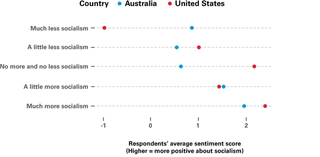
We then addressed recent claims suggesting young Australians and Americans preferred socialism more than older voters. It has been suggested that this is because they are too young to remember the horrors of the Soviet Union and Mao’s China. However, our results suggest older Australians and Americans are more likely to use positive words to describe socialism. However, younger respondents were more likely to say they think greater levels of socialism would improve their country.
Preferences for more socialism, by age
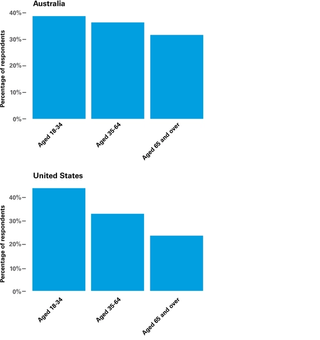
Ignorance and support for socialism
We then addressed the claim that it is ignorance that leads to greater support for socialism. We did this by examining those respondents who were unable to explain what they understoof the term ‘socialism’ to mean. This included those who provided nonsense explanations (‘social activities’, ‘they should on Twitter and Facebook and Instagram’) or who just could not provide one (‘I’m not sure’, ‘no idea’, ‘I really dont know’).
Our results suggest some of the criticism is valid. As can be seen in the figures below, for Australia. 28 per cent of Australians fell at the first hurdle, with 'don’t know', 'unsure' or 'no clue' responses. Another 13 per cent of Australians reported the term means being 'social' or 'sociable', spending time with friends, or talking with others (those who believed in meant using Facebook or Instagram were particularly interesting). Just 59 per cent offered a response that was even close to any conventional definition of socialism (greater equality, socialising the means of production, etc).
The rates of being unable to provide a response, or believe ‘socialism’ meant to be ‘social’ were highest among the youngest respondents, with more respondents under 20 unable to define socialism than define it.
Things are different in the United States, though. The 's' word has been thrown around far more frequently in America than in Australia. While 24 per cent of Americans were still unable to provide a coherent response, only 2 per cent said they believed the term meant being 'sociable', or similar. In the United States, 74 per cent offered a response that was close to a conventional definition. Although younger Amerians were less likely than older Americans to be able to define the term, more than 60 per cent of even the youngest groups could still do so (compared to less than 30 per cent of young Australians).
Attempts to define socialism, by age
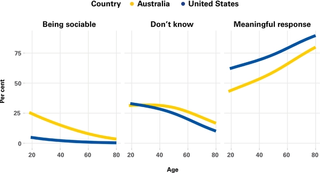
It is not necessarily ignorance driving support for socialism. In the figure below we plot the proportion of respondents unwilling or unable to provide a credible explanation of socialism, by their preferences for more or less socialism. We do this for both countries, and find that it is not respondents who support (or oppose) socialism who are unable to articulate what it means. Fewer than 20 per cent of Americans who thought more socialism would be a good thing could not articulate what socialism meant in a free text questions. For Australia, the figure was even lower, at less than 10 per cent. In fact, pro-socialist Australians were more able than most to explain what the term meant. Rather, it was those who are unwilling or unable to take a position who could not explain the meaning of the term.
Respondents non-attitudes towards socialism, by their preference for more or less socialism
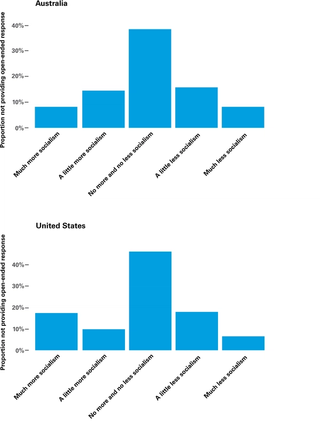
Socialism and the socialisation of the economy
When trying to understand how our respondents felt about socialism, we wanted to get at the ideas behind it. This included how our respondents felt about whether it was better if the state or the private sector managed most of the economy (a key tennet of socialism).
To understand whether Australians and Americans had strong views about whether the means of production should be privately owned and operated, or publicly owned and operated by the government we asked:
Is it better if the private sector or the government owns and operates services that provide
- Roads and highways
- Aged care
- Health care and hospitals
- Banking and insurance
- Electricity, gas and water
- Railways, buses
- Airports and airlines
- Schools and universities
- Supermarkets and grocery stores
When examining the data from this question, we found very different results in each country. The overall patterns were similar: roads and highways, healthcare and hospitals, were the most popular areas of government ownership and operation in both Australia and the United States; banks and insurance, supermarkets and grocery stores were the least popular.
However, in Australia support for government ownership and operation was high for almost everything. It was only airports and airlines, finance and retail that there was not majority support for public onwership. In the United States, support for government ownership and operation was lower, and only a majority proposition for roads and highways (and then only barely).
Support for government ownership of the economy
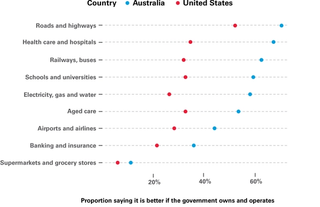
These different results are explained by two factors: the different partisan patterns (detailed below) and opinions of older respondents in the two countries.
In Australia, voters aged 65 and older were much more likely to support government ownership of key parts of the economy. Of the nine types of businesses we asked about, this group of voters supported public ownership for six at rates of around 75 per cent or higher. Australian respondents under the age of the 35 were much less likely to support public ownership. However, for five of the nine types of businesses we questioned them on, this support was still around half, or higher.
In the United States though, all age groups generally had low levels of support for government ownership and operation. Younger respondents were generally more supportive, but this was always minority support. The only segment of the economy older voters were more supportive of public ownership — and the only one there was majority support among any age group, was roads and highways.
Support for government ownership of the economy by age
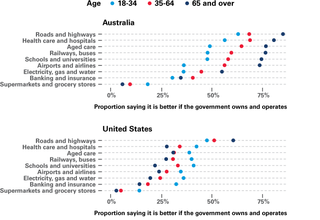
Moving to partisan patterns, we can see that a large part of the difference between American and Australian respondents on these issues is the difference between voters supporting right of centre parties. As the figures below demonstrate, Democrats look like Labor voters on most of these issues, showing very high levels of support for public ownership throughout much of the economy. Republicans do not look like their Coalition counterparts, however.
While there is little difference between Labor and Coalition voters on most of the business types we asked them about (healthcare and hospitals, banking and insurance, are the only two exceptions), the differences between Democrats and Republicans are vast on every item except supermarkets and grocery stores (where Democratic support for government ownership was low). Republican acceptance of public ownership was below 25 per cent on every item (including healthcare, public transport and education) except roads and highways. Even on the latter support for government operation was under half.
it is these partisan differences, and the very low level of support for government involvement in the economy by Republicans, is what drives many of the differences we observe between Americans and Australians on these issues.
Support for government ownership of the economy by vote in 2016
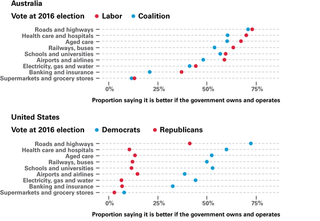
Survey details
Responses were weighted by YouGov to ensure samples representive of the Australian and American populations. The Australian sample was weighted by age, gender, education, region (crossed with city, non-city) and vote at the 2016 Australian federal election. The US sample was weighted by age, gender, race, education, region, voter registration, and vote choice in the 2012 and 2016 presidential elections.
The margin of error is approximately ± 3 percentage points for results reported for the full sample of both the Australian and American surveys. It is larger for sub-groups of the full samples and for differences between the countries.
Background to the USSC-YouGov poll
In September 2017, the United States Studies Centre announced that it had partnered with global survey company YouGov, which now provides the Centre with exclusive, monthly polling data from the United States and Australia; tracking perceptions of political leadership in both countries, and unique, targeted insights on a diverse range of topics.
CEO of the United States Studies Centre Professor Simon Jackman, a leader in public opinion research, has previously worked as one of the principal investigators of the American National Election Studies and partnered with media outlets including the Guardian Australia and the Huffington Post on pre-election polling. He said the results provided by YouGov as part of the new partnership will allow the Centre to analyse and publish unprecedented comparative data.
“The United States Studies Centre has taken a keen interest in the attitudes and opinions of people in our region, with research like our surveys into America’s role in the Indo-Pacific. This exciting new partnership with YouGov gives us the opportunity to broaden that focus to public opinion in the United States and then contrast that with the views of people in our own backyard,” Jackman said. “The Centre has a mandate to deepen Australia’s understanding of America. This ongoing commitment to charting public perceptions in both countries is an ideal way for Australians to gain perspective on the United States.”
YouGov is a market research and opinion polling company headquartered in the United Kingdom, with operations in Europe, North America, the Middle East and the Asia-Pacific.







